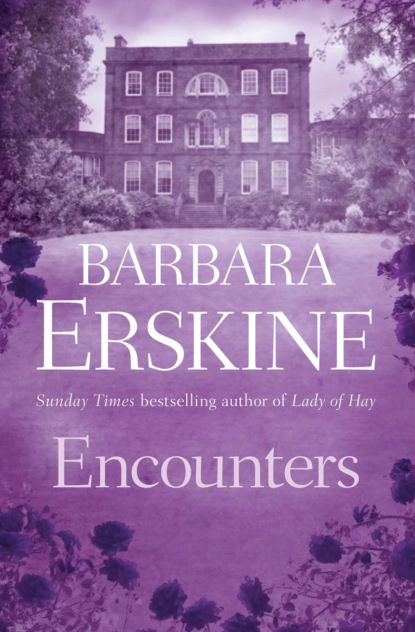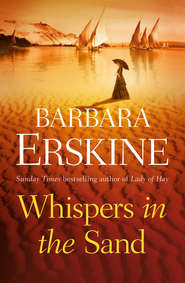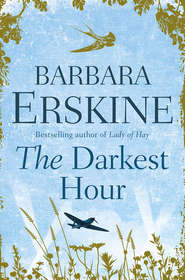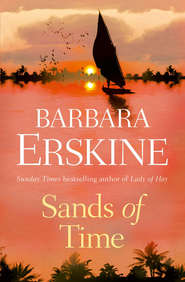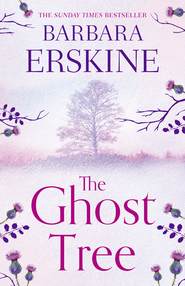По всем вопросам обращайтесь на: info@litportal.ru
(©) 2003-2024.
✖
Encounters
Автор
Год написания книги
2018
Настройки чтения
Размер шрифта
Высота строк
Поля
‘Hey, you’ve been stung – and it’s my fault, I’m sorry.’ His gaze had missed nothing and she sat wondering as hardly seeming to search for it his hand reached instinctively for some dock and soothed it against her skin.
‘Do you know about birds?’ he went on, as gently he replaced his salve with a fresh leaf. ‘That was a kite. They’re pretty rare round here and very timid.’
Jacie found herself smiling at him, reassured. ‘I don’t really know very much, but I sketch birds sometimes.’ Her glance went to the sketchbook lying in the grass where it had fallen with tumbled pages. He reached for it and slowly turned them, pausing here and there to look longer and nod. He came to sketches of birds – buzzards cleaving the sky on their arched golden wings; curlews, a pheasant – and she saw his face soften into something which was almost a smile.
‘You’ve a good eye,’ he said quietly and she found herself smiling, ridiculously pleased by his admission.
She was almost disappointed when he said suddenly, ‘You’d best go now, before the other bird comes to sit his turn on the eggs,’ but obediently she had taken back her sketchbook and half wriggled, half crept away from the ruins. Preoccupied again with his glasses he had not even raised his hand to say goodbye.
But he had found her two days later on the moor. And he smiled for the first time properly, his eyes matching the wash of ultramarine sky she was laying on the heavy-grained paper and for the first time in her life she was completely unembarrassed and at her ease with a man. The faint golden blush which he detected on her skin was put there by the wind and the green moorland sun, not by her realization that he was looking no longer at her picture but at her face. He had seen at once the beautiful eyes she had inherited from her mother.
It was then that he calmly asked her her name and told her that his was Brian. He stopped and picked up a discarded sketchbook from the heather and flipped through the pages. Then he set it down without comment, sitting easily beside her on an outcrop of slaty rock, one knee updrawn, clasped by his strong sun-burned hands. He watched as she bent once more to her paints, unselfconsciously continuing to work on the landscape. Their silence was companionable, uncommitted and she took his attention and lack of comment as a quiet compliment on the competence of her work.
She saw him several times after that; sometimes in the distance when he would lift a hand and stride on, making no effort to come over to talk and sometimes they would meet and would smile and walk together, falling naturally in step and talking of plants and birds and painting and sometimes of farming, but never of themselves. She thought he must be a farmer of some kind, but she never asked and he never told her what he did.
Nor did she see at first the quiet contentment in his face when he glanced in her direction as they walked together down the mossy tracks. When, almost imperceptibly, their hands touched she didn’t draw away.
Then, once, turning to him, her face full of laughter as they talked she glimpsed suddenly the warmth in his eyes and the smile that was especially for her. Her laughter died for a moment on her lips and then she found herself smiling again, at him.
‘It’s good to have someone to walk with, Jacie,’ he said quietly. That was all. But she understood.
It puzzled Jacie that she was at ease with him. One night she sat down in the dim light of her bedroom and tilted the flower-painted plastic shade on her dressing table lamp to throw a clear unflattering light on her face and gazed earnestly at herself in the mirror. It was an old glass, black-speckled with the image distorted slightly on one side, making her temple and hair ripple and move oddly. She smiled involuntarily and was amazed at the vivacity which suddenly lit her face.
Why, she was asking herself, was she not shy and embarrassed with Brian? Why should this man be the only man with whom she had never felt afraid – save her father, who had gone away so long ago and left an aching void in her life? She leaned forward to look more closely in the mirror, remembering suddenly how he would swing her up in his arms so she could wind her legs into the small of his back and bury her face in the strength and security of his chest. Always he had been there and she had known that he always would, until the day she came home from school and found her mother crying bitterly, face down on the bed. She knew now that her father had no strength, no security to offer and that he had made her mother miserable till the day he left, but rational adult explanations could not dispel that secure safe feeling which he had engendered and which lingered in her longing.
Brian seemed to have that feeling about him too. She knew instinctively that his were the kind of hands in which a wild creature would lie without fear and so – if ever he should ask it – would she.
She shook her head wearily and picked up her hair brush. It wasn’t as though he were that much older than she either. Ten years? Probably less; automatically she ran her fingers over the tiny web of lines beneath her eyes, gently easing them flat. Then slowly she began to brush her hair.
‘I hear you were talking to Brian Dexter up on the moors yesterday,’ Mrs Finch commented as she fed Jacie scrambled eggs next morning. Who had told? The rocks? The lonely gossiping buzzards? ‘He’s a nice man, he is; but that wife of his … no better than she ought to be that one – Ann, she’s called – having an affair with young Jim Lloyd like that! Serve her right that he’s divorcing her. Divorce is too good I reckon. And he still loves her, you know; they say he still loves her. Some say he nearly went out of his mind when he found out and now he spends all his time alone on that moor, brooding. It’s a wicked, wicked shame. And he’s worth a hundred Jim Lloyds any day of the week.’
‘I didn’t know.’ Jacie was gazing fixedly at her eggs. There was a pause and then she went on quietly, ‘He never talks about himself.’ Nor of course did she.
She stared at the coffee pot as Mrs Finch picked it up, conscious of a sudden weight of sadness. It threatened her, this new intimate detail of Brian’s life. She wished she didn’t know, although it explained perhaps the nature of the bond between them now. For he too must mistrust the world, he too find himself apart …
That day, consciously, Jacie looked for him on the moors, but she didn’t find him there and she didn’t dare go back to the abbey. It belonged to Brian and his pair of kites. He would take her there in his own time to see his birds if he wanted and she must wait. For the first time since she had begun sketching the moors she found them lonely and a little melancholy as the warm summer wind rippled the heather and the green bracken and stirred the thorn bushes clinging to the scattered outcrops of rock.
He found her when he chose, which became more and more often as the weeks wore on. She never mentioned what she knew. She put the knowledge behind her as being part of his life which must never come between them, never spoil their careful impersonality. They talked though, all the time, and went for long walks across the countryside, climbing the hills and sitting on the edge of the river watching for kingfishers and laughing at the antics of the dipper as it plunged from its rock to walk beneath the water on the bed of the stream. And stealthily they went to visit the eyrie in its tall tree within the ruined walls of the abbey and Jacie saw the three ridiculous bald-fluffy heads of the young craning for their food as the parents swept down out of the sky.
They would picnic together, she and Brian, sharing her packed lunches which, though nothing was said at the farm, had mysteriously doubled in size and it seemed to Jacie that for the first time in her life she was almost happy.
‘You must sketch the birds for me when they’re flying,’ he murmured as they crouched side by side behind the abbey wall watching the nest.
She nodded, her fingers gripping the cold crumbling stones which sheltered them. ‘How long will it be now?’ To her, the gaping beaks and the long necks visible in the nest seemed enormous already.
‘Not long. Look! The hen bird.’ His whisper made her look automatically up, but all she noticed was the firmness of the hand he had laid upon hers on the stones of the wall.
For a moment they forgot the birds and looked at one another and she saw the unspoken emotion in his eyes. Then he had turned away and abruptly releasing her fingers he raised his field glasses once more to the tree.
It was Brian who taught her, after he had teased her for huddling habitually under a scarf, to walk fearlessly in the rain, throwing back her head to feel the cold freshness of it on her skin as he made her shake out her hair to the damp and the fresh soft-scenting drizzle. And it was in the rain that he first kissed her gently, holding her against him and kissing her again as the cool drops ran down her upturned face, before he turned sadly away.
Summer grew heavy and languid and fearfully she began to count the days which remained of her holiday, willing time to slow down. In the abbey the young tested their wings and jumped up and down on the edge of their untidy nest high in the tree. They were ready to fly – and Jacie knew she was in love. But it was a humble, sad, compassionate, half fearful love that could not declare itself and dared not hint at its existence before the pain of the man at her side who still loved his Ann with such despair.
When at last the nest was empty they went more often to the abbey, walking up the cart track through the waist high ripening corn; they explored the woody valley in which it lay and the dark stone walls which so easily evoked an echo of pure voices sadly intoning the plainsong down the centuries. Jacie loved it there in spite of – perhaps because of – its sadness. It was Brian’s place more than any other.
And there it was that she broke the spell of the summer. ‘I have to go home soon, Brian. I hate to leave, but I must. I have to go back to work.’ They were standing in the long seeding grasses in the chapter house of the nuns.
Silently he took her hand and squeezed it. ‘I’ll miss you, Jacie.’
Her eyes filled with tears. ‘Brian, I shall come back. Next year.’ And then it had happened. Her love and anguish had betrayed her and she had rushed on: ‘By then the divorce will be over and you’ll be free … I know you’ll be free. You’ll forget her one day.’
He didn’t question how she knew. He said nothing, but his face tautened with pain and she saw misery and memories where only a moment before had been clear happy laughter.
In silent despair she walked away from him then, and there in the corner of the lichen-powdered wall she saw the neat intricacies of the spider’s web looped across from stone to stone. She gazed at it for a moment and then bitterly swept her hand up through the threads, watching them snap and coalesce and cling fragmentarily to her fingers. That easy it was to break something fragile and beautiful. She could feel the childish tears welling under her eyelids. Then Brian was beside her. He said nothing, but she saw him looking at the ruin of the web and she felt desperately guilty and ashamed. She wanted to help him, to stand by him, to give him strength. But she did not know how. She wanted to be with him, but she didn’t dare remain. Instead she walked away.
That was the last time she saw him. Two days later she packed and went home, her shell once more tightly and protectively around her.
Mrs Finch sent her the notice of the divorce from the local paper. There was no editorial comment, just the bland headlines ‘Well-known local farmer divorces wife’ and a few lines giving the names and addresses of the three people involved. So few words to cover so much that had happened.
She started to write to him then. But what do you say to a man in his position, when you ache with love and dare not say it? She tore up the half-written letter slowly and regretfully and let it fell, piece by piece, into the waste paper basket.
It was Brian who wrote in the end. A short note: ‘Any chance of you getting up here in the New Year? You’d enjoy sketching the hills in the snow. The kites are still here.’ That was all.
And so she went, and walked in the early dusk down the cart track to the abbey and found the frosted web which meant so much to her. She didn’t find Brian that evening, but she didn’t worry. She knew he would be there somewhere, and perhaps tomorrow, perhaps the next day, as she sketched in the snow on the moors he would come and find her, as he always had before.
Summer Treachery (#ulink_3ecce381-1761-54c1-a5a3-2b8c578c4979)
The bedroom was high ceilinged and cool, lavishly furnished with a wealth of eau-de-nil silk.
‘Well?’ My sister was watching me closely as I threw my bag down on the double bed and looked round.
‘Davina, it’s lovely. Quite the most beautiful room I’ve ever seen.’
She looked pleased and for the first time since she and I had been alone together we exchanged a real smile.
I wasn’t exaggerating. It was all quite fabulous: the room, the villa, the gardens which I had glimpsed as Tim and I left the car and walked up the broad flight of shallow stone steps to the porticoed front door. Everything.
I crossed to the windows and pushed back the shutters. Outside the Florentine sky was a blinding blue over the hazy valley. The shimmering afternoon heat hit into the room and I realized why every shutter on that side of the house had been closed. The view was breathtaking. If Tim and I could cement our love and happiness again anywhere it would be here.
Our marriage had not been happy. Perhaps I had been too young. Perhaps I had not realized what living with a brilliant but temperamental man would mean, especially when he was a man whose career as a sculptor brought him into intimate contact with so many beautiful women – and this while I had to keep on teaching to provide us with a steady income. Whatever the reasons, life had been hard for us. But now Tim was beginning to find recognition; I had given up my job and we had begun again.
Davina joined me on the balcony and we stood for a moment in silence. She was looking down the valley and I studied her surreptitiously. It was a year since we had met. That had been at her wedding to Simon Delacourt when I, her junior by five years, had already been married for eighteen months. Simon was rich, charming, clever; exactly what Davina had wanted. And who could blame her, with his country house in Sussex, his yacht, his executive jet and this fabulous villa in Tuscany?
We had always been close, but in her relationship with Simon she had been secretive; I had felt excluded, and wrapped up by then in my own unhappiness I had not paid my sister much attention, assuming that she had everything she wanted.
So why did she look so strained now? I studied her profile. There were lines at the corners of her eyes and between nose and mouth I did not remember.
She turned suddenly, groping in the pocket of her loose jacket and produced a pack of cigarettes and a small elegant lighter. ‘Want one?’





